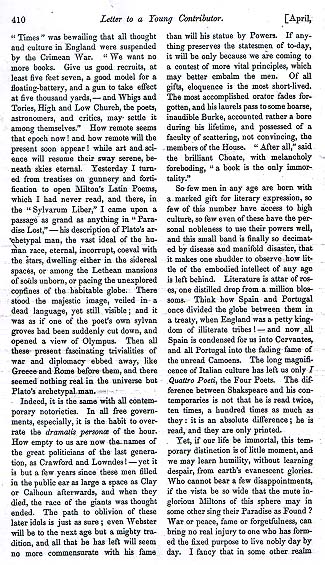Manuscript:

Transcription:
"Times" was bewailing that all thought and culture in
England were suspended by the Crimean War. "We
want no more books. Give us good recruits, at least
five feet seven, a good model for a floating-battery,
and a gun to take effect at five thousand yards,--and
Whigs and Tories, High and Low Church, the poets,
astronomers, and critics, may settle it among them
-selves." How remote seems that epoch now! And
how remote will the present soon appear! While art
and science will resume their sway serene, beneath
skies eternal. Yesterday I turned from treatises on
gunnery and fortification to open Milton's Latin
Poems, which I had never read, and there, in the
"Sylvarum Liber," I came upon a passage as grand
as anything in "Paradise Lost,"--his description of
Plato's archetypal man, the vast ideal of the human
race, eternal, incorrupt, coeval with the stars, dwell
-ing either in the sidereal spaces, or among the
Lethean mansions of souls unborn, or pacing the
unexplored confines of the habitable globe. There
stood the majestic image, veiled in a dead lang
-uage, yet still visible; and it was as if one of the
poet's own sylvan groves had been suddenly cut
down, and opened a view of Olympus. Then all
these present fascinating trivialities of war and
diplomacy ebbed away, like Greece and Rome
before them, and there seemed nothing real in the
universe but Plato's archetypal man.
Indeed, it is the same with all contemporary
notorieties. In all free governments, especially, it is
the habit to overrate the dramatis personae of the
hour. How empty to us are now the names of the
great politicians of the last generation, as Craw-
-ford and Lowndes!--yet it is but a few years since
these men filled in the public ear as large a space
as Clay or Calhoun afterwards, and when they
died, the race of the giants was thought ended.
The path to oblivion of these later idols is just as
sure; even Webster will be to the next age but a
mighty tradition, and all that he has left will seem
no more commensurate with his fame than will his
statue by Powers. If anything preserves the states-
-men of to-day, it will be only because we are
coming to a contest of more vital principles, which
may better embalm the men. Of all gifts, eloquence
is the most short-lived. The most accomplished
orator fades forgotten, and his laurels pass to some
hoarse, inaudible Burke, accounted rather a bore
during his lifetime, and possessed of a faculty of
scattering, not convincing, the members of the
House. "After all," said the brilliant Choate, with
melancholy foreboding, "a book is the only immor-
-tality."
So few men in any age are born with a marked gift
for literary expression, so few of this number have
access to high culture, so few even of these have
the personal nobleness to use their powers well,
and this small band is finally so decimated by dis-
-ease and manifold disaster, that it makes one
shudder to observe how little of the embodied intell-
-ect of any age is left behind. Literature is attar of
roses, one distilled drop from a million blossoms.
Think how Spain and Portugal once divided the globe
between them in a treaty, when England was a petty
kingdom of illiterate tribes!--and now all Spain is
condensed for us into Cervantes, and all Portugal
into the fading fame of the unread Camoens. The
long magnificence of Italian culture has left us only
I Quattro Poeti, the Four Poets. The difference bet-
-ween Shakespeare and his contemporaries is not
that he is read twice, ten times, a hundred times as
much as they: it is an absolute difference; he is read,
and they are only printed.
Yet, if our life be immortal, this temporary distinction
is of little moment, and we may learn humility, with-
-out learning despair, from earth's evanescent glories.
Who cannot bear a few disappointments, if the vista
be so wide that the mute inglorious Miltons of this
sphere may in some other sing their Paradise as
Found? War or peace, fame or forgetfulness, can bring
no real injury to one who has formed the fixed purpose
to live nobly day by day. I fancy that in some other realm



